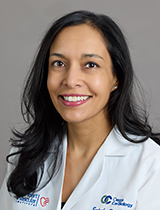Matters of the heart: Are women different?

Key things women need to know about heart health
More women die from heart disease than from cancer, chronic obstructive pulmonary disease, Alzheimer's, and accidents combined. More women than men die from strokes every year.
Good news
Women of all ages can help reduce their risk of heart disease, heart attack, and stroke. Whether young, child bearing, or post-menopausal, there are things to know, and things to do.
Not like on TV
“There’s a myth that heart disease mostly affects men,” said interventional cardiologist Sudeshna Banerjee, MD of Oregon Cardiology at PeaceHealth Sacred Heart Medical Center, RiverBend. “Women are every bit as much at risk for heart disease as men.”
“We see certain symptoms for heart attacks on TV, and people often think that’s necessarily what will happen - a person gets sweaty and describes chest pressure,” said Dr. Banerjee. While this is typical for some men and a few women, for most women a heart attack can feel different in many ways:
- Pain in the chest on either side.
- Pain in the back, especially between the shoulder blades.
- Shortness of breath.
- Left arm pain.
- Nausea only.
Nausea: a surprising symptom for women
“I’ve seen women really confused after an ER visit for just nausea, when their EKG shows evidence of a heart attack,” she said. “It’s important for women – and their family members - to know that nausea can be the only symptom.”
Just normal aging, or a warning?
“Sometimes I hear women think they are ‘just aging’ when they experience an increase in fatigue or shortness of breath in just a few weeks or months. For this increase to come on so quickly is not a normal sign of aging, and often the first signs of angina.
“If a woman experiences this, she should see her doctor immediately,” said Dr. Banerjee.
Angina is a symptom of heart disease, when there is not enough blood flow to the heart muscle. This is often a result of narrowed blood vessels, usually caused by hardening of the arteries (atherosclerosis).
Well-known risk factors
Some heart disease risk factors for women are often well known, and should be shared with your doctor:
- hypertension (high blood pressure).
- high cholesterol.
- diabetes.
- family history.
Stress: no pill for this risk
“I want to talk more about stress,” said Dr. Banerjee. “It can do so much heart damage to women, and there is no pill to treat it.”
Stress harmful to women’s hearts can be physical or social, or even from chronic illness or pain, causing long-term inflammation leading to heart disease, and many other chronic diseases.
There are many specific stress-management tools women can use to reduce their risk.
Cholesterol: beyond the overall number
Low HDL, the good cholesterol, can be just as dangerous a risk factor as a high overall number. Dr. Banerjee emphasizes the importance of continuing cholesterol checks for anyone with any risk factors.
Take care of your pipes
“Our arteries are just pipes, and sometimes with buildup,” said Dr. Banerjee. “If a clog becomes more than 75 percent, then that is a real problem. At rest, you’re probably feeling fine, but with activity, this level of blockage can cause dangerous symptoms. We can treat those blockages surgically with a stent or bypass, but we’d rather prevent surgery altogether.”
Exercise is the best prevention
“I wish I could write a prescription for exercise,” said Dr. Banerjee. “I’d have half as many patients if I could. It’s absolutely the number one prevention of heart disease.”
“Exercise creates all kinds of wonderful chemicals to keep the lining of your arteries healthy,” she emphasized.
Diet and supplements
“Food is always the best source of nutrients,” explained Dr. Banerjee. “The body just absorbs them better.”
Increasing omega 3 and omega 6 fatty acids from some fish can contribute to heart health, as can decreasing all other animal fats.
Dr. Banerjee would rather see women (and men) eat two servings of fish per week than use supplements. “Healthy eating is always better,” she said. “And always give details of any supplement – dose and frequency – to your doctor.”
What’s special about women?
Women have certain things that can raise their risk. These include pregnancy-related problems as well as medicines they may be taking, such as birth control pills or hormone therapy.
Birth control pills.
Using birth control pills might increase your risk if you smoke and are older than 35 or if you have a family history of atherosclerosis or blood-clotting disorders. Healthy, young, nonsmoking women probably do not increase their risk of heart disease and stroke when they take low-dose birth control pills.
Pregnancy-related problems
Problems during pregnancy, such as gestational diabetes and preeclampsia, have been linked to a higher risk of heart disease and stroke later in life. Experts are studying whether other pregnancy-related problems are linked to heart disease. Tell your doctor about any problems you had during pregnancy.
Immune diseases
Some immune-related diseases, such as lupus and rheumatoid arthritis, have been linked with a higher risk of heart disease in women.
Migraine headaches
Migraine headaches, especially migraines with aura, have been linked with stroke in women younger than 55.
The "heart" truth about menopause
What is it about menopause (after a woman’s menstruation cycles stop) that causes a woman's risk of heart disease to spike significantly? In addition to reduced estrogen levels, there's plenty of evidence to show that more women than men develop high blood pressure and high cholesterol when they reach middle age. Menopause increases the levels of total cholesterol, triglycerides, and LDL "bad" cholesterol. It also decreases the levels of HDL "good" cholesterol.
"We think younger women are protected by the female hormone estrogen, which is produced at much higher levels until we reach menopause," says Margo Kozinski, MD, medical director and interventional cardiologist at PeaceHealth Southwest Washington Medical Center. “When you compare groups of middle-age women, heart disease rates are two to three times higher for those going through menopause."
"Let's face it, aging and menopause are inevitable, so we have to look at the things we can control, like eating habits, exercise, and smoking cessation," says Dr. Kozinski.
A little weight loss goes a long way
Research shows that obese women who lost 6.5 percent of their body weight during a six-month program — that's just 13 pounds for a 200-pound woman — succeeded in lowering their blood pressure and cholesterol.
Dr. Kozinski says, "Because it's not always easy to lose weight, just remember that eating a low-calorie diet and increasing your level of activity will still go a long way toward helping your heart."
Hormone therapy
Because menopause and hormones are linked with the health of your blood vessels, you and your doctor will discuss your health and your risk of heart disease and stroke to make sure hormone therapy is safe for you. Risk for heart disease varies based on when you start HT in menopause and how long you take it. Short-term use of hormone therapy in early menopause has less risk than when it is started later in menopause. Risk also depends on the type of HT used (estrogen or estrogen plus progestin).
Better to be safe
Women are more likely than men to delay seeking help for a possible heart attack.
Women delay for many reasons, like not being sure it is a heart attack or not wanting to bother others. But it is better to be safe than sorry.
Call 911 or other emergency services right away if you have symptoms of a heart attack. These include:
- Chest pain or pressure, or a strange feeling in the chest.
- Sweating.
- Shortness of breath.
- Nausea or vomiting.
- Pain, pressure, or a strange feeling in the back, neck, jaw, or upper belly, or in one or both shoulders or arms.
- Lightheadedness or sudden weakness.
- A fast or irregular heartbeat.
After you call 911, the operator may tell you to chew 1 adult-strength or 2 to 4 low-dose aspirin.
Wait for an ambulance. Do not try to drive yourself.
“Two out of five women will die of cardiovascular disease, making it the leading cause of death in women. In fact, heart disease kills more women than all forms of cancer combined,” warns Dr. Kozinski.
Schedule an appointment with your doctor right way if you have any concerns regarding signs or symptoms listed here.







